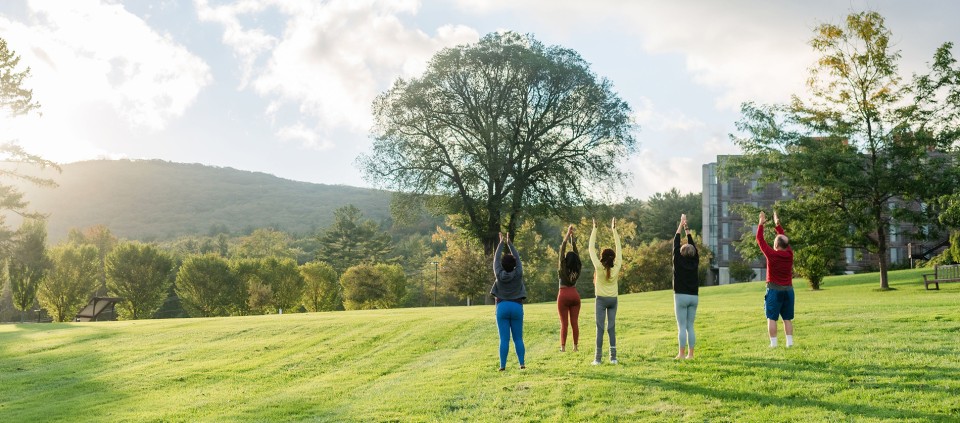Relationship Tips for Building Equity

Imagine a Kripalu where anyone who wanted to access what we have to offer was able to do so. That when they arrived, they felt like they belonged here, that they were seen in their fullness, and that their growth process was supported. This is the Kripalu that the Equity Team seeks to create.
The current iteration of the Equity Team at Kripalu began in January 2021 after a six-week consciousness-raising session with Michelle Cassandra Johnson and Kerri Kelly of Race and Resilience, as well as several months of strategic planning conversations throughout 2020 that underscored the importance of accessibility and radically reimagined retreat as strategic pillars for the organization.
We know that meaningful and authentic change takes time. We have gone through a deep process together of building trust and the Equity Team has had both joyous and affirming conversations and deeply difficult and uncomfortable conversations. Navigating these conversations requires a set of group agreements that orient us to the culture we are creating. These agreements are inspired by, and in some cases, the same as the agreements we learned from our work with Race and Resilience.
These are our agreements, and how we, as an Equity Team, have worked and grown with them over the past year. It is our hope that they inspire you to navigate your own personal and collective work towards a more equitable world in service of the liberation of all.
1. Locate yourself within your truth, context, and physical/mental/emotional body.
Social location is a measure of an individual’s proximity to power in society. Each of us has a multitude of identities, some of which place us closer to power and some which remove us from power. Furthermore, one’s proximity to power changes based on the social context we find ourselves in. For example, I hold a leadership position at Kripalu, so in this space, my experience and opinion can steer decisions in my area. Yet, growing up in a lower-class household, I have financial disadvantages such as student debt and limited savings that would put me and my family at risk should we face an emergency. Locating oneself in a social situation grants us insight into how to show up. Am I wielding my personal power in the most productive way? Do I need to get out of the way and listen to someone else’s lived experience? We discuss this in our Equity Team meetings and ask questions such as, how can we positively disrupt power dynamics in our work? Who communicates with the CEO—is it someone who regularly has access to that person? Or do we give someone with less organizational power the opportunity to have direct access to the CEO?
It’s also important to recognize where we are in our physical/mental/and emotional bodies. As yoga practitioners, this self-awareness is something we work towards through our practice. Being able to say “I’m not 100% today” or “I’m ready to take on the world” or “I need to rest” or “I can help out” is vital to being honest with each other and to beginning to dismantle a dominant culture that expects us to be productive and energetic at every turn.
2. Practice mutual care and responsibility.
Mutual care is a practice that helps us take care of one another. Dominant culture wants us to believe that we are individualistic islands and that our worth is self-made. Dominant culture uplifts those who go it alone and rise to the top. How exhausting! Humans are social creatures, and we need each other. Our lives are interconnected in a complex web of interbeing. Mutual care happens when we can be honest and say "go take care of yourself. We can hold this until you are rested and we trust that it is reciprocated". That is where mutual responsibility comes in. We are accountable to each other, and it’s our responsibility to care and communicate in a way that builds trust.
In our Equity Team, mutual care and responsibility show up as people opt to take on certain tasks because they have the energy to do so. This changes from situation to situation. Just like geese, the lead goose is not always at the front. They take turns leading as others need to be supported and benefit from the updraft of the group. And all the while, their honks verbally reassure each other to keep going.
3. This is a brave space, not a safe space. Be willing to do things differently and experience discomfort.
At Kripalu, we aspire to create a place where everyone can be their authentic selves, even if that is vulnerable and messy. But the truth is that we cannot guarantee safe spaces for everyone, despite our best intentions because we can never anticipate everyone’s experience of a given situation, or how their past experiences influence their experience of this moment.
Instead, we seek to create a brave space. A space where we are given the space to say what needs to be said, even if it is not perfect or pretty or universally accepted. This brave space is a place from the heart, a place that requires our courage. We are willing to ask questions, we listen to understand one another not to fix or respond, but to tap into curiosity and compassion to reach a place of understanding.
We believe that culture shift is necessary to bring about the collective liberation that we need to see in our society. We cannot change the culture by doing things the same way we have always done them. We must be willing to do things differently, to slow down, to acknowledge feelings, to question power structures for these changes to happen. Naturally, this can cause discomfort. Learning a new yoga pose or a new language is uncomfortable. There will be mistakes. We will hold each other in our learning.
4. Seek heart connection, centering relationships over outcome.
Swami Kripalu once said, “the key to my heart lies in the heart of another.” We often think of this teaching when we are in Share Circles, experiences where participants are invited to listen fully to others, without the need to fix, change, or offer feedback. In a Share Circle, the speaker is encouraged to speak as fully as possible—to take the uninterrupted time to be heard. What seems like a simple exercise is often incredibly profound. We use this concept in our Equity Work, listening to understand as we seek heart connections.
Connecting across lines of difference can be uncomfortable and dissonant. How do we hold the realities of people’s lived experiences, while some of us are learning and trying to comprehend others’ reality without having experienced it ourselves? When we are talking about social justice, inequity, or processing harm, the conversation is often emotional. Sometimes our instinct is to soothe or fix the people around us when what they really need is to be heard, seen, and respected for their experiences and opinions.
The Equity Team had several meetings where things were just... awkward. We were trying to identify problems and fix them and fast-track solutions. And it stalled the work. One of the things we’ve learned through this process is that relationship building is the first and necessary step to moving forward.
Dominant culture wants us to produce, to find outcomes and solutions. The culture we want to live in centers relationships. We listen, we seek to hear each other from the heart, and from that place, we can vision and make the future together.
5. Expect and accept non-closure. Trust the process.
Equity work brings up a LOT of questions. There is no one-size-fits-all solution to creating Equity in a space. There is no checklist. There may be a map, but we must navigate the terrain. Knowing this and working with it means that we have to expect non-closure, and we have to accept that things may not be “solved” each time we come together. It will be uncomfortable, but it is part of trusting the process, allowing the dust to settle so that the way forward can become clear.
The Kripalu teachings are invaluable tools we have to stay with discomfort; noticing thoughts and feelings from a place of witness consciousness, riding the wave of sensation, and trusting the process of unfolding has served us well on the Equity Team. This is an opportunity for us to take yoga off the mat and shift into the culture we know is possible and we wholeheartedly invite you to join us on this path.
Ellen Rose is the Director of Kripalu Programming and a member of the Equity Team.
Full Bio and Programs